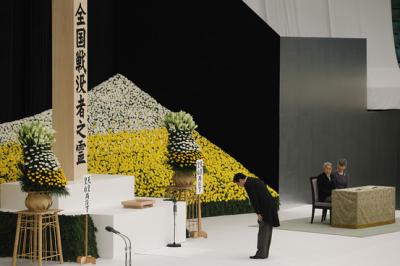In an important sense an apology prefigures the course and nature of a state’s strategic thinking with great clarity, for it derives its power not from the obliqueness of its meaning, but from the manner which it imperceptibly alters the plane of a state’s diplomacy.
An apology is foremost a question of principle and the nature of legitimacy and thus poses most forcefully the problem of a nation’s experience and historical consciousness. It requires a recognition of ambiguity, nuance, and pragmatism for a state to attempt a reconciliation of its domestic expression of truth with that of another. Apologies are never without their discontents, for states are the repository and embodiment of a nation’s will and historic destiny. Yet it is the essence of statesmanship to impart an awareness of the tragic dimension of a contest of absolutes. Statesmen have the unenviable task of infusing their diplomacy with an intuition of both contingency and history. It translates too perfectly man’s limited ability to shape perception born of historical experience. Memory, may indeed be the shadow of the past, but it rules over nations with the same force as necessity, and power.
Japanese Prime Minister Naoto Kan’s apology to South Korea, released on the eve of the 100th anniversary of Japan’s annexation of the Korean peninsula, represents an effort to overcome the outrages of the past, which have so poisoned relations between the two. Kan’s statement of apology seeks to square away the legacies of Japan’s 36 year occupation of the Korean peninsula, and the suffering it engendered. For decades, the legacy of the occupation, and the intensity of feeling it generated, seeped into the consciousness of the two states. Generations of Koreans imbibed the stories of Japanese atrocities, and Korean suffering, while Japan, for domestic political and foreign policy reasons, sought through evasion and omission to transfer the problems of the past to the unknowable future. Yet it is the nature of such suffering that makes transference and evasion impossible, for it extracts too high a price in terms of the soul of a nation. It resists too perfectly the magic of leaders who seek through symbolism, and personal apology, to banish the ghosts of suffering.
The task of shaping the contours of Japan and South Korea’s relations has fallen to the distant power in Washington. In place of recognition of the past, an uneasy bargain was struck based on the cold calculation of war reparations, economic development assistance, and alliance with the United States. The balance of power in East Asia and the exigencies of the Cold War conspired to obscure the nature of their omission. Yet a relationship that seeks its identity in omission, cannot fundamentally resolve the tension of its purpose. It cannot forever banish the intuition that the pragmatism of the present is, in fact, anything more than the dogmatism of petty calculation.
Apology is a great qualifier of a state’s intentions. Weakened by setbacks in recent elections, Prime Minister Kan is an uncertain steward of Japanese power at its moment of maximum weakness. Yet it is not difficult to discern the outlines of a new strategic calculus implicit in this apology. The nature of an apology to South Korea is inescapably entwined with the question of China’s rise and the security of East Asia.
Steeped in the language, and intellectual history, of Murayama’s 1995 statement, Kan’s apology represents a concentrated effort to reshape Japan’s relationship with South Korea. Kan’s preference would be for the diplomacy of discreet calculation, tempered by recognition that an apology is, in an important aspect, the strategy of the intangible par excellence. His decision to delay the annual defense paper, and the stated intention of cabinet ministers not to make the pilgrimage to Yasukuni Shrine on August 15, reflects the ascendance of a sobering recognition that the balance of power in East Asia has become increasingly precarious.
American power, once so unassailable, shows signs of giving way. It has been fundamentally challenged by the confluence of a more assertive political and military power in Beijing, and found wanting in its response to North Korea’s political and strategic provocations. China’s expansive definition of its ‘core national security interests’ and growing clout in the halls of the East has shaken Japan’s strategic calculations. Through subtlety, pure technique, and the manipulation of the question of history, China has imperceptibly altered the political equilibrium in East Asia. For Japan, the margin of security that it once relied on to secure its freedom of maneuver has narrowed sharply, and in its place, an austere appraisal of Japan’s options has taken hold. Whereas Hatoyama was willing to split the difference, and cut a deal with China, Kan has struck a more cautious, chastened pose. Gone are the halcyon days of illusion and ‘yuai’ and in its place the unrelenting ebb and flow of power and interest once more promises to gain new adherents and traction in Tokyo.
An apology, concentrates a nation’s mind as to the problems of peace, and the nature of legitimacy. It forces states in their maturity to weigh their fidelity to the promise of reconciling the past, with the requirements of the present, and the hope for the future. In this there is something novel about Kan’s statement of apology. It offers for the first time the belated recognition that the basis of any Japan-South Korea strategic partnership rests, not on the omissions of the past, but on the need to reconcile the principles and nature of their historic settlement. For the people of both countries, Kan’s apology offers a precarious, yet real possibility, of breaking the impasse in the two countries’ relations and providing a much needed reconciliation between Tokyo and Seoul over the nature of their strategic interests, and mutual obligations.
Andrew Levidis is a PhD candidate at the University of Melbourne and a Monbukagakusho scholar of Kyoto University.

